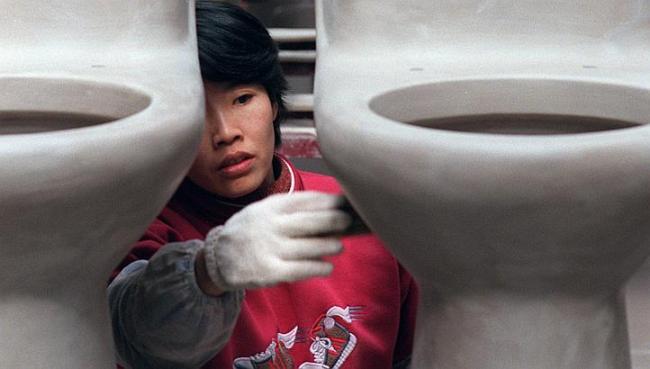Property agent Wang Qi decided on modern decor for her new apartment in Beihai city in southern Guangxi. But tradition ruled when it came to the toilet.
“Friends wonder why I did not opt for a sit-down toilet, which is more modern and fitting for a young person,” the 28-year-old told the Sunday Times. “But I am too used to squat toilets, which I have used since I was young. I think it is also more hygienic as it is the only toilet, which means visitors will use it.”
Her choice puts her firmly in one camp of a uniquely China debate between “squatters” and “sitters” on the type of toilet that befits a country whose status and needs are changing.
“Friends wonder why I did not opt for a sit-down toilet, which is more modern and fitting for a young person,” the 28-year-old told the Sunday Times. “But I am too used to squat toilets, which I have used since I was young. I think it is also more hygienic as it is the only toilet, which means visitors will use it.”
Her choice puts her firmly in one camp of a uniquely China debate between “squatters” and “sitters” on the type of toilet that befits a country whose status and needs are changing.

The debate intensified after the China National Tourism Administration pledged in January to launch a “toilet revolution” ― 33,500 new toilets will be built and 25,000 existing ones upgraded within three years at tourist spots, highway stops and restaurants frequented by tourists.
Most of China’s public loos feature squat toilets, if not mere holes in the ground. There is often no door, flush or toilet paper. All that plus the stench can be a big put-off for foreign visitors.
Nevertheless, the grand plan has many Chinese worried that familiar squat toilets are on the way out.
Squatters argued that sit-down toilets are unhygienic.
Beijing-based interior designer Chen Yanji, 40, would rather bear with the discomfort until she gets home, if she cannot find a squat toilet. When desperate, she squats on the toilet bowl.
“It is a precarious position, but better than the risk of catching an infectious disease,” she said.
Indeed, in an incident at an airport in Hefei province last month, a man suffered cuts when the toilet bowl he was perched on broke under his weight.
Proponents also pointed to studies that squatting is better for moving one’s bowels.
A Global Times commentary cited a 2010 Japanese study which showed that “compared with the sitting position, squatting brings less constipation, less bloating and less straining, along with faster elimination, better muscle tone and improved colon health.”
Some claimed that as squatting is so closely identified with the Chinese people, doing away with or reducing the number of squat toilets could have an indelible impact on Chinese identity.
But the opposing camp is not taking any of this sitting down. Squat toilets, they argued, are out of place in a future superpower. They said sit-down toilets are more convenient for the elderly, pregnant women, those with disabilities and foreigners.
Brazilian student Bruno Suzart, 22, recalled his culture shock when he arrived last October for his master’s program at Tsinghua University and encountered the squatting toilet. “I didn’t know how to use it at first, though, thankfully, my friends had prepped me beforehand and even provided me with toilet paper,” he said. “It was an uncomfortable experience and I tried to get out as fast as possible.”
For now, squatters far outnumber sitters. An online straw poll in January showed that 88 percent of 215,120 respondents preferred to squat.
But ask IT specialist Qu Hua, 45, and he admits that he sometimes spends up to an hour on his porcelain throne, reading the newspaper or using his smartphone.
Tourism expert Liu Simin does not think squat toilets should go. Of the 3.7 billion who visited China attractions last year, only about 128 million were from overseas, including Hong Kong, Macau and Taiwan, noted professor Liu, who is the deputy secretary-general of the Beijing Tourism Society.
What the tourism authorities should do, he said, is to build more toilets, ensure their cleanliness and educate the public on their proper use. “Squat and pedestal toilets each have their place and can coexist in China.”
By Kor Kian Beng
(The Straits Times)
-
Articles by Korea Herald


![[AtoZ into Korean mind] Humor in Korea: Navigating the line between what's funny and not](http://res.heraldm.com/phpwas/restmb_idxmake.php?idx=644&simg=/content/image/2024/04/22/20240422050642_0.jpg&u=)

![[Exclusive] Korean military set to ban iPhones over 'security' concerns](http://res.heraldm.com/phpwas/restmb_idxmake.php?idx=644&simg=/content/image/2024/04/23/20240423050599_0.jpg&u=20240423183955)

![[Herald Interview] Why Toss invited hackers to penetrate its system](http://res.heraldm.com/phpwas/restmb_idxmake.php?idx=644&simg=/content/image/2024/04/22/20240422050569_0.jpg&u=20240422150649)
![[Graphic News] 77% of young Koreans still financially dependent](http://res.heraldm.com/phpwas/restmb_idxmake.php?idx=644&simg=/content/image/2024/04/22/20240422050762_0.gif&u=)







![[Exclusive] Korean military to ban iPhones over security issues](http://res.heraldm.com/phpwas/restmb_idxmake.php?idx=652&simg=/content/image/2024/04/23/20240423050599_0.jpg&u=20240423183955)



![[Today’s K-pop] Ateez confirms US tour details](http://res.heraldm.com/phpwas/restmb_idxmake.php?idx=642&simg=/content/image/2024/04/23/20240423050700_0.jpg&u=)